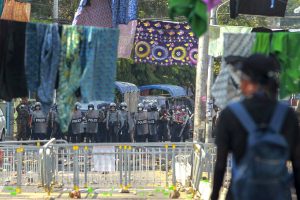Two years have now passed since the Myanmar military stole an election from the people and launched an illegal coup on February 1, 2021. Hours after the population realized what had happened, organized protests denouncing the junta erupted in the streets. Thousands of demonstrators massed, demanding that the junta return power to the people. Among the participants, 60 percent were women who were firmly declaring their place in the revolution to come. Despite the horrors which have taken place over the last 24 months, women remain vigilant and committed to the shared struggle for peace, democracy, and equality in Myanmar.
Women are fundamental in facilitating progressive change and have proven to be so throughout Myanmar’s history. The relationships and trust that they have fostered within their communities have enabled them to act swiftly and courageously. Despite the discriminatory and often misogynistic attitudes that undercut women’s participation in public and political life in Myanmar, women continue to make gains through protest and the opposition movement.
Since its establishment in 1999, the Women’s League of Burma, an umbrella organization comprising 13 women’s organizations working for the advancement of the status of women towards a peaceful and just society, has noted that women human rights defenders are targeted explicitly by the military junta and face a multitude of human rights violations. Like all human rights defenders in Burma, women human rights defenders have faced arbitrary arrest, detention, and torture for simply demanding that their fundamental human rights be respected.
Further, as the role of women evolves, they are pushing beyond the boundaries of preconceived gender norms in Myanmar, which stipulate that they only be assigned responsibilities within the home. Generations of protests against military rule have seen women sacrifice their physical and mental well-being and economic security to fight for freedom. The Spring Revolution is no exception.
As the military junta continues to block all meaningful pathways for peace and democracy in Myanmar, women have responded by advocating for women’s protection and gains in the women’s movement for gender equality. In the days following the coup, the “Sarong Revolution” saw women break away from patriarchal beliefs by waving their Hta-Mein while chanting slogans calling for the overthrow of the military junta. Their act was one of defiance in response to the coup and the misogynistic attitudes that recognize the female garment as one that strips men of their power.
Women have taken on a range of roles in Myanmar’s revolutionary movement. They have taken up arms on the frontlines of battles to defend their freedom while supporting the country’s various opposition movements with food, funds, and resources. Women revolutionaries have also used poetry, art, and podcasts to speak truth to power. Younger generations have used the technological advances of the last decade to question patriarchal norms and institutions and to educate and inform the masses about how the junta suppresses the voices of marginalized groups, including women. Women lawyers have also offered pro-bono legal support to those detained by the military administration, while women are well-represented at the upper levels of the opposition National Unity Government.
The contributions of women-led civil society organizations who remain active on the ground, despite the highly challenging circumstances are another example of their bravery. These groups and their leaders have taken significant risks to continue to provide humanitarian aid and relief to displaced populations. They have offered protection pathways for victims of conflict-related sexual violence. The groups have also supported the needs of internally displaced people, especially pregnant women, the elderly, and children, providing them with food, medicine, and shelter. The amplification of the voices on the ground demanding an end to the brutal assaults they face is done through the advocacy of women’s groups who stand firmly with their communities.
The international community must take seriously the calls made by women human rights defenders and support them, including by funding women’s rights programming and advocacy. The main perpetrator of the crisis unfolding in Myanmar is the military, which believes that it is the exception to every law and democratic norm and principle.
Global actors need to take decisive action and commit to the recommendations put forward by civil society organizations, to publicly reject the so-called State Administrative Council, and to continue raising the voices of the women and people of Myanmar. In addition, they must work to create a political space for women’s rights organizations and civil society to hold the military junta accountable for its crimes against humanity, including via a referral to the International Criminal Court, and help end – at long last – the country’s cycle of impunity.

































